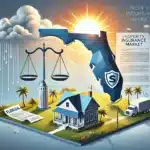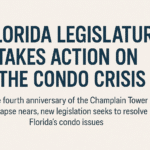Florida Legislature Takes Action on the Condo Crisis: A Step Forward
When I first heard about the legislation Governor Ron DeSantis signed this month, I’ll admit—I was skeptical. It felt like another instance of kicking the can down the road. The condo crisis in Florida has been simmering for years, long before the heartbreaking collapse of Champlain Tower South in June 2021 that claimed 98 lives. For too long, condo associations have prioritized lower monthly fees over long-term safety and maintenance. But after digging into the new legislation, I believe the state may have finally struck a realistic balance between safety and affordability.
The Roots of Florida’s Condo Crisis
Many condo associations have historically opted to keep fees low, often at the expense of future repairs. This meant little to no financial reserves were set aside to address inevitable structural issues. The Champlain Tower South tragedy was a wake-up call. As far back as 2018, engineers warned of serious structural damage—particularly deteriorating reinforced concrete in the tower’s basement. Tragically, these repairs were not carried out in time, resulting in the collapse and the loss of 98 lives three years later. As we approach the fourth anniversary of the tragedy on June 24th, it remains a somber reminder of the consequences of deferred maintenance.
A Legislative Response: Senate Bill 4-D
In the aftermath, Florida lawmakers passed Senate Bill 4-D in May 2022. It was a major reform requiring:
- Milestone structural inspections at the 25- or 30-year mark (based on proximity to the coast) for condo buildings over three stories.
- Follow-up inspections every 10 years.
- Evacuation mandates for buildings deemed unsafe.
This framework ensured aging structures wouldn’t slip through the cracks unnoticed.
Financial Reserve Requirements: A Double-Edged Sword
The bill also required that all condo associations conduct a Structural Integrity Reserve Study by the end of 2024 and begin fully funding those reserves in their 2025 budgets. Crucially, it restricted associations from reallocating these reserves to other purposes.
While essential for safety, this requirement had painful side effects. Owners faced massive assessments—sometimes nearly equal to the unit’s market value. Many couldn’t afford the sudden financial burden. Some took out second mortgages, drained retirement accounts, or sold their homes altogether. As a result, Florida’s condo market became saturated with listings, pushing prices down and putting even more pressure on longtime owners.
Lending Restrictions Add Fuel to the Fire
To make matters worse, Fannie Mae added hundreds of Florida condo buildings to its ineligible list for underwriting. That means buyers couldn’t secure mortgages for these units, drying up demand and stranding sellers—especially retirees on fixed incomes—without viable options to sell or refinance.
House Bill 913: A Realistic Compromise?
Enter House Bill 913, the Legislature’s latest attempt to stabilize the market. Recently signed into law, it brings three key changes:
- Delays full reserve funding requirements, offering associations a breather.
- Allows associations to take out loans to meet reserve obligations.
- Extends structural study deadlines, giving associations more time to comply.
Of course, loans must be repaid, and monthly fees will rise to cover them—placing long-term pressure on homeowners and buyers alike. Still, it’s arguably the most pragmatic approach available: addressing safety while avoiding one-time, financially devastating assessments.
Is There a Better Solution?
This legislation is not a silver bullet. The condo crisis won’t disappear overnight, and Florida’s condo real estate market will likely remain sluggish for some time. But this plan acknowledges the complex realities of ownership, aging infrastructure, and economic pressure on homeowners.
Have a better idea? I’d genuinely love to hear it. Because for the first time in years, we’re not just talking about Florida’s condo crisis—we’re doing something about it.



